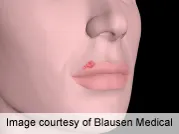Many people carry herpes virus without developing telltale blisters
WebMD News from HealthDay

By Robert Preidt
HealthDay Reporter
TUESDAY, Sept. 17 (HealthDay News) -- A gene mutation explains why some people develop cold sores while others do not, according to a new study.
Cold sores -- blisters that appear on and around the lips -- are caused by the herpes simplex virus type 1 (HSV-1). Between 80 percent and 90 percent of people are infected with the virus, but only about one-quarter of them get frequent cold sores.
Scottish researchers analyzed blood samples from people affected by cold sores and found that they have a mutation in a gene called IL28b. This mutation means the body can't mount an adequate immune response to HSV-1.
"Most people carry the cold sore strain of the herpes simplex virus, but until now we never knew why only some of them develop cold sores," Professor Juergen Haas, of the University of Edinburgh, said in a university news release.
"Knowing that susceptibility to the virus involved relates to people's genes reinforces the need to research not only the evolution of viruses themselves, but also the susceptibility of hosts to infection," Haas said.
The study was published in the journal PLoS Pathogens.
The IL28b gene also is linked to treatment responses for hepatitis C patients. If this gene is mutated, patients are less likely to respond as well to treatment. The research provides further evidence that a single genetic mutation can be linked to different viruses, Haas said.
source : Frequent Cold Sores Tied to Genetic Mutation in Study








